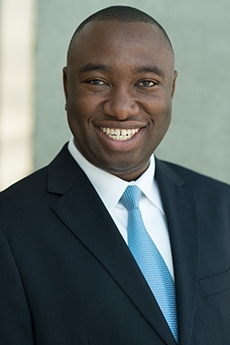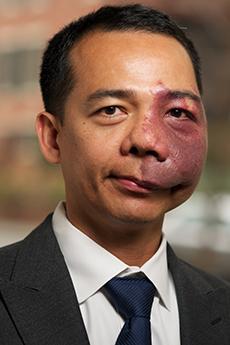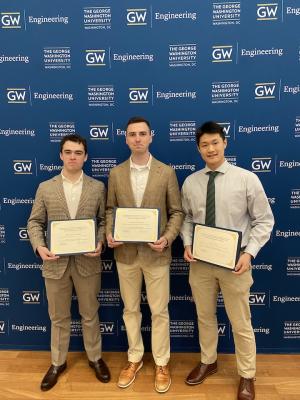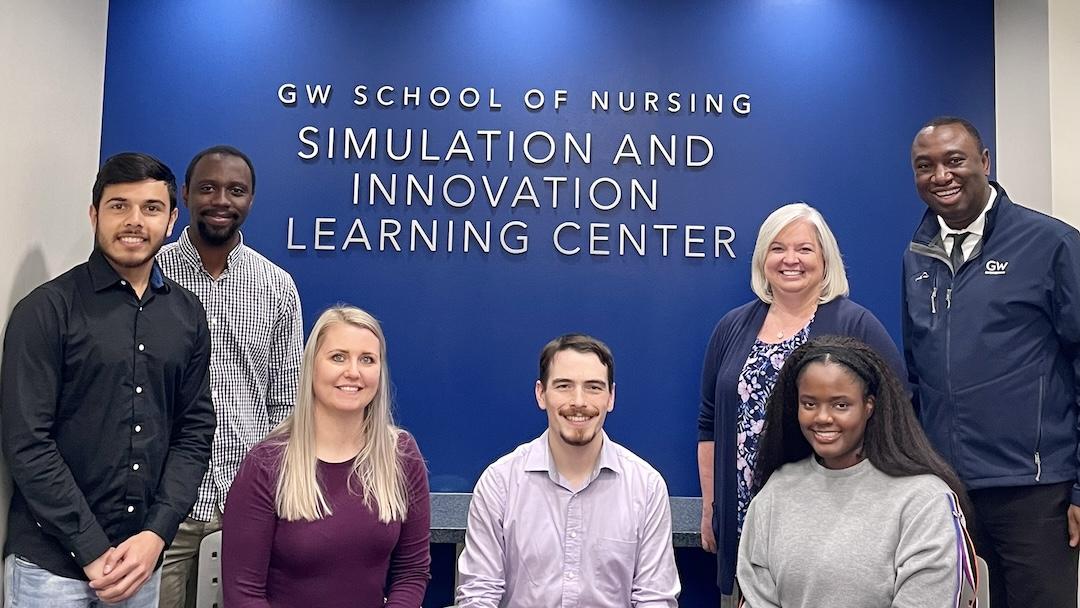Pioneering Systems and Innovating Resolutions for Complex Challenges

Greetings from the Department of Engineering Management and Systems Engineering (EMSE) at the George Washington University School of Engineering and Applied Science (GW Engineering). As the EMSE Department Chair, I am thrilled to introduce you to our community of faculty, students, and alumni who are at the forefront of addressing complex societal issues through systems engineering and management.
Developing solutions for grand challenges such as public health, trustworthiness in artificial intelligence (AI), advanced manufacturing, critical infrastructure systems, and privacy requires a holistic approach. At EMSE, we firmly believe that the success of any solution depends on embracing systems thinking. We understand that these challenges have deep-rooted connections to complex systems, and our mission is to develop innovative solutions that can genuinely make an impact. Within our department, we pride ourselves on tackling various intriguing and significant challenges. From efficiently responding to disasters and ensuring the resilience of global supply chains to devising technology and policy to combat rapid environmental change, investigating risks and harms of AI, and enhancing human-technology interaction, we engage in interdisciplinary, problem-driven research. We focus on the intricate interplay of dynamic components within complex systems and uncover how they fit together. Working alongside policymakers and technology leaders, we are dedicated to creating and implementing complex adaptive solutions that improve decision- making and shape the world around us.
To succeed in this endeavor, engineers must understand the technologies being developed and grasp the rapidly changing environments where these technologies will be applied. Within GW Engineering’s EMSE Department, we equip our students with comprehensive analytical tools and foster systems-level thinking. By combining engineering, management, business analytics, artificial intelligence, and technology, we empower today’s engineers, scientists, future industry leaders, and policymakers with the skills they need to enhance management and decision-making within their respective organizations. Our department cultivates an intellectual community that values collaboration, innovation, and societal impact. Together, we drive positive change and contribute to solving the challenging problems that span disciplines, countries, and cultures.
In this brochure, we highlight our continued leadership in hosting the AI4SE and SE4AI conference, returning in Fall 2025. Professors Caitlin Grady and John Helveston spearheaded several GW-wide efforts, including the GW Alliance for a Sustainable Future, while Professor Joost Santos was named a Fellow of the Society for Risk Analysis. Our students have also made an international impact by presenting at major conferences, including IISE and INFORMS. Haneen Al-Rashid, a DTAIS fellow, was featured in Devex Global Voices, and other DTAIS fellows participated in the “AI in the Wild” initiative. A senior design team mentored by Gralla won an award at the IEEE SIEDS at UVA for their project on AI and health, in partnership with DC Health and LMI.
Ekundayo Shittu, Ph.D.
Professor and Chair
Department of Engineering Management and Systems Engineering
School of Engineering and Applied Science
The George Washington University

FROM USAID TO TEACHING THE NEXT GENERATION: HANEEN AL- RASHID’S JOURNEY
“In international development, I impacted people’s lives and well-being through my work. My transition to academia was spurred by my desire to teach the next generation,” said Haneen Al-Rashid, a PhD Candidate in Systems Engineering, on why she left USAID Jordan to return to GW.
Working with USAID, Al-Rashid was intrigued by the responsible use of artificial intelligence (AI) in development. When she was invited to join GW’s Designing Trustworthy AI Systems program, she saw an opportunity to deepen her understanding of AI’s societal impact. Her research now focuses on human-AI interaction and its influence on decision-making.
A cornerstone of the program is a three-semester seminar that pushes students to connect technical work with real-world challenges, with attention to ethics, policy, and trust. One guest speaker emphasized op-eds as a way to bridge the gap between experts and everyday readers.
Using her background and doctoral research, Al-Rashid authored an op-ed for Devex, a major media platform for international development, arguing that AI will create new jobs in the developing world rather than replace existing ones. With proper AI training, she emphasized, individuals can thrive in information and communication technology careers and gain competitiveness in other fields.
Featured in Devex’s 2024 Global Voices collection, her piece exemplifies her thought leadership and the potential for inclusive progress in a rapidly evolving digital landscape.

USING AI TO STRENGTHEN DISASTER RISK MANAGEMENT
Natural hazard mitigation has never been more critical, as our world faces increasingly severe disasters like hurricanes, flash floods, and earthquakes. The 2019 Natural Hazard Mitigation Saves report by the National Institute of Building found that every $1 invested in mitigation yields an average of $6 in future savings, demonstrating the high return on investment (ROI) for hazard mitigation strategies.
Professor Joost Santos applies his expertise in systems engineering and dynamic input- output modeling to investigate the benefits of mitigation and the resulting economic effects across critical infrastructure sectors.
Santos played a pivotal role as an Investigator in the Natural Hazard Mitigation Saves report, which helped position mitigation investment as a strategic investment in national security and economic stability. Santos credits GW’s location in the heart of the nation’s capital for helping him influence disaster risk management policy.
“There is power in place. As a researcher based in Washington, D.C., I sit at the intersection of policy, science, and practice. I can ensure that my work in systems engineering, disaster risk analysis, and economic resilience doesn’t stay confined to academic journals – it informs national policy and global discourse,” Santos explained.
Santos and his collaborators have recently explored how artificial intelligence (AI) can be responsibly and effectively integrated into disaster management. Santos examines the advantages and risks of implementing AI in high-stakes environments and how these applications align with core risk science principles.
He and his collaborators have found that while AI enhances data-driven decision-making, automation, and situational awareness, it also introduces uncertainty and potential issues related to algorithmic bias. Santos states that successful trustworthy AI integration requires a foundation of risk analysis values—transparency, validation, and accountability.
Santos recommends hybrid frameworks that combine the strengths of the AI and risk analysis domains. These integrated approaches can retain the rigor of risk analysis models while leveraging AI’s scalability and data- processing capabilities.
“This dual perspective ensures that new tools are not only technically effective but also socially and operationally credible in guiding decisions that affect lives, infrastructure, and communities,” he concluded.
“AI in the Wild”: PhD Fellows Explore Real- World Impact
Artificial intelligence (AI) has become pervasive in our everyday lives and has quickly changed how we solve problems at home, school, and work. AI can transform society for good by helping address many of the world’s biggest challenges; however, we first must explore how to understand AI’s trustworthiness in practical contexts. Nine PhD fellows spent their summer exploring how to harness interdisciplinary knowledge and trustworthy AI to solve real-world problems.
The PhD fellows went on three “AI in the Wild” site visits, which kicked off their participation in a 10- week research formulation incubator. The incubator is part of the GW Co-Design of Trustworthy AI in Systems (DTAIS) program, a National Science Foundation Research Traineeship (NRT) that supports PhD students conducting research at the intersection of artificial intelligence and human work systems.
The site visits and summer incubator reflect the ethos of the DTAIS program – building a dedicated network of students, faculty, and industry professionals to tackle some of today’s essential questions about AI and the future of work.
This year’s site visits took the fellows to the Children’s National Medical Center, the MITRE Corporation, and the Washington Metropolitan Area Transportation Authority (WMATA). Each visit provided fellows with distinct AI use cases where trustworthiness is particularly critical.
“We connect with people and organizations that can provide a tangible experience in trustworthy AI for our students,” said Zoe Szajnfarber, DTAIS principal investigator, faculty director for GW’s Trustworthy AI Initiative (TAI), and EMSE professor. “We’ve had the opportunity to build a strong network of collaborators who value engaging with our students.”
After the visits, the fellows debriefed with one another and with faculty on how they can use the visits as inspiration for their research.
“AI in the Wild helps them come up with problems that benefit from an interdisciplinary perspective, and the incubator pushes them to jump in and get their hands dirty in trying to solve the problem,” Szajnfarber explained.
The “AI in the Wild” visits are just the beginning of empowering DTAIS fellows to be the next generation of AI innovators who help solve our world’s most pressing challenges.
Students Advance Emergency Response and Eco-Friendly Product Design
At the culmination of their undergraduate journey, EMSE students take on senior design projects that address real-world challenges, growing their technical expertise, project management, collaboration, and problem-solving skills along the way. Last academic year, one team helped DC Health improve how Washington D.C. identifies and responds to heat-related illnesses (HRI), while another partnered with Dell Technologies to support its 2030 sustainability goals.
As global temperatures rise, so do HRI incidents in the D.C. area, with 37 heat-related responses reported by D.C.’s Emergency Medical Services (EMS) alone on June 23, 2025. To support more accurate identification of HRIs, students analyzed EMS records using a large language model (LLM). The team collaborated with DC Health on establishing relevant terminology and with industry partner LMI on LLM prompt development, finding their LLM-based approach more effective in identifying HRIs than current methods. The team also pinpointed HRI hot spots to determine the optimal placement of heat relief stations, which earned them an Honorable Mention Award at the 2025 IEEE Systems and Information Engineering Design Symposium for their significant local impact.

To transition to a circular economy, Dell aims for 50% of its product content, by weight, to come from recycled materials by 2030. A student team supported this goal by modeling and examining a personal computer’s composition to determine the optimal recycled material content. They ensured that Dell obtained a balanced solution between recycled content and other circular economy goals by examining the effects of increased recycled content on greenhouse gas (GHG) emissions and costs for production and materials. This project pushed the team to address novel elements such as the steel and plastics lifecycle, from raw to recycled, GHG emissions, the recycling process chain, and the use of industry- grade systems models.
Senior design projects are more than a final assignment—they bridge the classroom and the real world. These students enter the workforce with experience in fast-paced environments, interacting with clients, and presenting their work, making them well-prepared to tackle future challenges and equipped with the confidence to innovate and lead.
Bridging Technical Expertise and Real-World Impact
GW’s Alliance for a Sustainable Future (ASF) is not just a research initiative, but a platform for breaking silos and fostering interdisciplinary solutions for a rapidly changing environment. Trained in various research methods, systems engineers like EMSE Professors Caitlin Grady and John Helveston are central to that mission.

“We’re positioned to play a leadership role in shaping what the Alliance becomes, being translators of technical outcomes to decision-making,” said Helveston.
As an industry scholar, Helveston studies stakeholder interactions in the automotive sector, particularly around electric vehicles (EVs), to inform clean energy policy. One recent project examines millions of EV listings at U.S. dealerships over eight years to better understand supply-side trends. As director of the Master’s in Data Analytics program, he uses this research as an example when training students in large-scale data analysis techniques.
Complementing Helveston’s domain-specific knowledge, Grady’s role is to drive purposeful progress. Leading ASF’s Energy Technology and Decision Making cluster, which includes her own work on water, energy, and food systems, she sparks collaboration among GW researchers. As Director of Impact and Innovation of ASF, she shares this impactful research through events and relationship building. Notably, she organized discussions on the future of EV and battery manufacturing, including one she led on enhancing U.S. competitiveness.
“Ecosystem building works to connect the dots. It sparks new ideas, strengthens partnerships, and ensures our research isn’t just published, it’s put to use,” said Grady.
Grady’s ultimate goal is to help ASF create actionable solutions in real-time. Demonstrating this potential, she’s actively collaborating with EMSE Professor Erica Gralla and an international affairs professor, Maryam Deloffre, on a project to gather data on the rapidly evolving global food assistance supply chain. ASF and GW’s Global Food Institute provided funding for this time-sensitive research in response to recent federal changes.
“That’s the kind of impact I believe in: meeting the moment, connecting disciplines, and making sure research helps shape better outcomes for people right now,” she said.

GW Hosts Critical Conversations on Relationship Between Systems Engineering and AI
Systems engineering plays a critical role in ensuring that we develop and govern artificial intelligence- enabled systems in a trustworthy manner.
The Systems Engineering Research Center (SERC) and the U.S. Army DEVCOM Armaments Center established the annual AI4SE & SE4AI Research and Application Workshop to foster collaboration among systems engineering and AI experts and practitioners.
The sixth AI4SE & SE4AI was hosted in September by GW’s Trustworthy AI Initiative (TAI). The conference’s theme for 2025 — “Systems Engineering AI that Works: Assuring Transformative Capabilities and Enabling a Digital Transformation” — fostered compelling discussions on how systems engineering can support trustworthy AI systems, and how AI tools can contribute to the systems engineering field and shape the workforce.
GW also hosted the 2023 event, where several faculty hosted technical talks on human-AI teaming, trustworthy AI, and digital engineering.
Zoe Szajnfarber, SERC Chief Scientist, faculty director for GW TAI, and EMSE professor, has been involved in the workshop’s planning and execution since 2022 and has chaired the event since 2024.
“This workshop has been a nexus for government, industry, and academia to advance critical conversations at the intersection of systems engineering and AI. It’s the only event like this, and it’s an honor to host it and showcase our department’s expertise at this intersection,” Szajnfarber shared.


